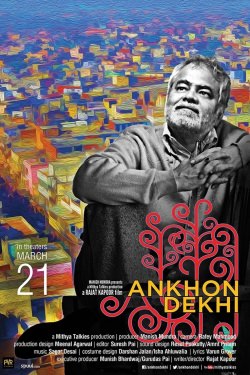Top Rated Films
Namrata Joshi's Film Reviews
-
As against a seething, fuming Fandry, Chauranga is a lot more muted and quiet in its rage. But the thread of protest runs through it nonetheless as Santu retaliates against each bit of random violence heaped against him or his brother.
-
…Sengupta fashions a lovely tale of love in times of recession. It’s about routinised work lives, the loneliness of living in shifts in your own homes, of being a family, yet not knowing the pleasures of eating and living together. But hope lives.
-
One of the most beguiling films of recent times, Qissa captivates even as it confounds.
-
Mary Kom plays out as a simple, unpretentious tale that picks up and dramatises important incidents from the champion’s life. The frenzy and excitement of a Raging Bull or Million Dollar Baby may not be there. However, the essential message speaks out loud.
-
Mishra, as the patriarch, Bauji, is the fulcrum and spine of the film. At once mercurial and patient, crazy yet sane, it’s a character difficult to pull off and Mishra literally internalises it. Seema Pahwa as his hyper, nagging yet loving wife is just as pitch-perfect. So are the rest. Maya Sarao as the live-wire daughter is a revelation. The relationships are convincingly handled. Be it the father-daughter bonding after a fight or the brothers falling apart. They feel so real that they could well be happening in your own family.
-
It’s in how Mehta captures the psyche of the Indian Muslim in the changing, increasingly polarised India. Shahid’s lower-middle-class Muslim family, its highs and lows, togetherness and differences, are portrayed with warmth and simplicity.
-
It’s a film of meditative pauses and life as many of us have felt and lived. It reaches out to the heart as well as the mind. Not the kind of film you see very often.
-
There are times when, instead of following the film’s narrative, you end up playing ‘spot the mistake’. I did think that making all the kids of Anupam Kher’s family wear clothes off the same yarn was excessive. That happened in the ’50s and ’60s, not so much in the ’80s.
-
Hindi mainstream cinema, despite its predictability, can at times leave you with a smile on your face and a song in your heart. Band Baaja Baaraat is one such endearing film. The story might be the usual: boy meets girl, they get into a misunderstanding and eventually come together again. However, what makes it special is that it feels delightfully real, is strongly rooted in contemporary Delhi middle class.
-
Initially, the jerky, odd camera movements of LSD can prove quite unsettling for an audience used to sanitised, textbook frames. The kitschy metafilm (inspired from pulp fiction) adds to the bizarreness. But it doesn’t take long to fine-tune your vision to the inventive look, feel and idea of LSD.

























